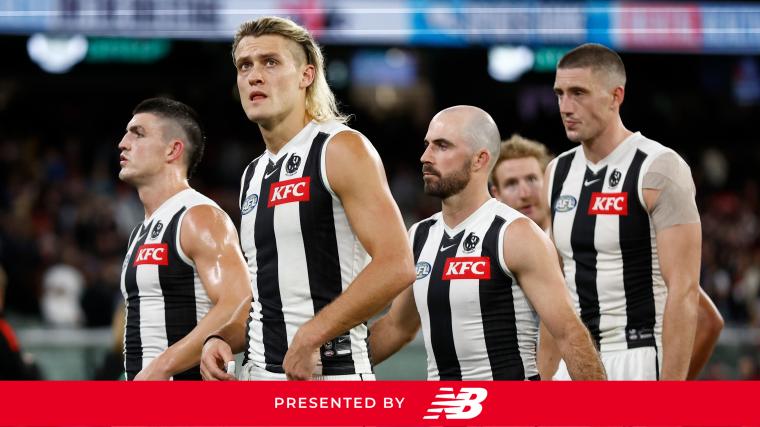Fostering An Environment That Celebrates Talent While Allowing Room For Growth And Learning, Even In The Face Of Mistakes.

Recent developments surrounding
Jaidyn Stephenson, the former
Collingwood player who now
contemplates an early retirement, have
sparked intense discussion within the
AFL community. Dale Thomas, a
respected former Collingwood and
Carlton star, has stepped forward to
publicly address what he describes as
“disheartening and unfair” treatment
that Stephenson has endured from
Magpies supporters, casting a spotlight
on the pressures that professional
athletes often face, even after their
tenure with a team has ended.
A Promising Start Turned Sour.
Stephenson’s career began on a high note
with Collingwood, where he was drafted
as the sixth overall pick in the 2017 AFL
Draft. The young forward quickly made
an impression on the field with his
agility, speed, and knack for scoring
under pressure. In his debut season, he
was named the AFL Rising Star in 2018,
an honor that positioned him as one of
the league’s brightest young talents.
However, despite his early success,
Stephenson’s journey with Collingwood
took a turbulent turn.
In 2019, Stephenson was involved in a
high-profile gambling controversy that
saw him suspended for ten games and
fined $20,000. While the AFL and
Collingwood management dealt with the
issue and allowed him to return to the
field, some fans weren’t as forgiving.
Since then, his relationship with the
Collingwood fanbase has been strained,
marked by online criticism, negative
comments on social media, and public
scrutiny. Eventually, in 2020, he was
traded to North Melbourne in a move
that many saw as a fresh start for the
young forward.
Dale Thomas Speaks Out.
Dale Thomas, who is known for his
openness and advocacy for players’
mental well-being, recently spoke on his
podcast about the hardships Stephenson
has faced and the toll it may have taken
on his mental health. Thomas pointed
out that the backlash Stephenson
received from Collingwood fans was
particularly harsh, especially given that
Stephenson was young and
inexperienced when the gambling
incident occurred.
“People forget that he was just a kid
trying to navigate his way in professional
sports,” Thomas said. “The amount of
negative comments and criticism he
received, even years after leaving
Collingwood, is disappointing. It’s
important to remember that players are
human beings, and this sort of treatment
can have lasting impacts.”
Thomas went on to suggest that the
relentless criticism might be a
contributing factor in Stephenson’s
reported contemplation of early
retirement. He emphasized that support,
rather than hostility, is crucial for
players to grow and overcome their
mistakes. His comments have resonated
with fans and players alike, sparking
conversations about the importance of
mental health support in the AFL.
The Role of Fans in Player Well-Being.
Thomas’ statements have reignited
debates about the role of fans in shaping
a player’s career and mental health.
While fans play a vital role in boosting
morale, the responsibility of support is
often overlooked in instances where a
player stumbles or makes a mistake. The
scrutiny can be overwhelming,
particularly for younger players who
may lack the experience to handle the
intense pressure that comes with high-
stakes professional sports.
Fans’ reactions on social media have
been mixed. Some have expressed
empathy for Stephenson, admitting that
the criticism went too far. “He made a
mistake, but he’s still a human. Everyone
deserves a second chance,” one
supporter commented on a Collingwood
fan page. Others, however, maintain that
players must be held accountable for
their actions, especially when they
violate the standards expected of
professional athletes.
The situation has sparked calls for a shift
in how fans approach criticism and
support for players. AFL has seen a
growing awareness of mental health
issues, with many clubs implementing
mental wellness programs and
psychological support for their players.
Supporters are being encouraged to
consider the human side of athletes,
recognizing that excessive criticism can
lead to lasting consequences beyond the
field.
Collingwood’s Official Response and Future Outlook.
While Collingwood Football Club has not
made a formal statement regarding the
treatment of Stephenson by fans, the
topic has not gone unnoticed by club
officials. Sources within the club have
expressed regret that Stephenson’s
relationship with the fans soured,
especially considering his contributions
during his early years with the Magpies.
This sentiment aligns with Collingwood’s
recent efforts to foster a more positive
and supportive culture within its
fanbase.
In the wake of Thomas’ comments, both
Collingwood and North Melbourne
supporters have been called to reflect on
their roles in encouraging young players.
For Stephenson, this period may serve as
an opportunity to decide whether he still
has the passion to continue his career or
if an early retirement would be a
healthier path.
The Broader Impact on Player Mental Health.
As more athletes like Stephenson and
Thomas speak up about the mental toll of
fan criticism, the AFL community is
beginning to reassess its approach to
player support. The league has seen a
rise in players dealing with mental
health challenges, prompting clubs to
emphasize wellness resources and
mental health education. Stories like
Stephenson’s underscore the need for a
broader cultural shift in sports, where
fans and players alike prioritize
compassion and understanding.
For Stephenson, the road ahead remains
uncertain. Whether he decides to
continue playing or retire, the challenges
he has faced are a stark reminder of the
pressures that come with professional
sports. Dale Thomas’ advocacy for
empathy and understanding may inspire
a new, more supportive era within the
AFL, where players are valued for their
humanity as much as for their
performance.
In the meantime, fans across the league
are encouraged to support their players,
fostering an environment that celebrates
talent while allowing room for growth
and learning, even in the face of
mistakes.



